- Home
- David Downing
Zoo Stationee Page 10
Zoo Stationee Read online
Page 10
Thats enough to make anyone resentful, Russell said. Not being offered something you want is bad enough; someone else turning it down just adds salt to the wound.
McKinley looked at him as if he were a magician. You know, that never occurred to me.
When did you last go home? Russell asked.
Oh, the Thanksgiving before last. But I write quite often.
Russell thought about his own family. His mother in America, his half-brother in Leeds. Bernard was well over fifty now, the single offspring of his fathers brief liaison with the army nurse who treated himin more ways than oneafter the Gordon campaign in Sudan. Russell hadnt seen him in years, and had no particular desire to do so. There were a couple of uncles in England, one aunt in America, cousins dotted here and there. He hadnt seen any of them either. It was time he took Paul to England, he thought.
He looked at McKinley, happily puffing away at his pipe. Do you never get homesick? he asked.
Sure, sometimes. Days like today I miss the sunshine. I know everyone thinks San Francisco is always shrouded in fog, but it isnt. Its still the loveliest city Ive ever seen. He smiled. But this is where the story is.
Unfortunately.
Well, yes. I was wondering. . . . Im arranging this interview next weekI dont know which evening yetand I wondered if youd be willing to come along. My German is pretty good, but yours is obviously a lot better, and the only time I met this woman I could hardly understand anything she said. And I really cant afford to misunderstand anything she tells me.
Who is she?
McKinley hesitated. She used to work for the Health Ministry.
This is the big story?
McKinley grinned briefly. You could say that. You remember that story I did on asylums last year?
Russell did. It hadnt been at all bad. The American had managed to raise quite a few awkward questions, and it was hardly his fault that no one else had demanded any answers. I remember, he said.
Well, this woman was one of the people I interviewed. She told me a pack of lies, as far as I could tell. And then last week she contacted me out of the blue, said she was willing to give me some information about some of the other stuff Ive heard.
About the asylums?
Yes and no. Look, he said, looking around. I dont want to talk about it here. Lets go back to the house.
Okay, Russell agreed. He was beginning to feel intrigued, despite himself.
As they walked back to Neuenburgerstrasse he kept an eye open for possible shadows, and noticed that McKinley was doing the same. None crept into view, and the street outside their block was empty of cars.
The Knauer boy, McKinley said, once they were ensconced in Russells two armchairs. I dont think his parents gave him a Christian name. He was blind, had only one arm, and part of one leg was missing. He was also, supposedly, an idiot. A medical idiot, I mean. Mentally retarded. Anyway, his father wrote to Hitler asking him to have the boy killed. Hitler got one of the doctors employed by the KdF to confirm the facts, which they did. He then gave the childs own doctors permission to carry out a mercy-killing. The boy was put to sleep. He paused to re-stoke his pipe.
Thats a sad story, Russell said cautiously.
Theres two things, McKinley said. Hitler has never made any secret of his plan to purify the race by sterilizing the mentally handicapped and all the other so-called incurables. And the Nazis are always going on about how much it costs to keep all these people in asylums. They actually use it as an example in one of their school textbooksyou know, how many peoples cars you could build with what it costs to feed and clothe ten incurables for a year. Put the two things together and you get one easy answer: Kill them. It purifies the race and saves money.
Yes, but. . . .
I know. But if the Knauer boy is expendable, why not the others? About one hundred thousand of them, according to the latest figures. Tell the parents theyre doing it to cut short the childs suffering, give them an excuse not to have the problem anymore. In fact, dont even tell the parents. Spare their suffering by saying that the child died of natural causes.
One hundred thousand of them?
Perhaps not, but. . . .
Okay, it sounds feasible. It sounds like the Nazis, for Christs sake. But are they actually doing it? And if they are, do you have any proof that theyre doing it?
There are all sorts of indications. . . .
Not good enough.
Plans, then.
On paper?
Not exactly. Look, will you come and see this woman with me?
Russell knew what the sensible answer was, but McKinley had him hooked. Okay, he said, checking his watch and realizing that hed be late for meeting Effi.
Once out on Lindenstrasse he decided to spend some of his anticipated earnings on a cab. As it swung around the Belle Alliance Platz and headed up Königgrätzerstrasse toward Potsdamer Bahnhofplatz, he watched the people on the sidewalks and wondered how many of them would protest the mercy killing of 100,000 children. Would that be one step too far, or just another milestone in the shedding of a nations scruples?
RUSSELL DIDNT EXPECT TO find many similarities between Tyler McKinley and Albert Wiesner. On the one hand, a boy from a rich family and country with a rewarding job and instant access to a ticket out of Nazi Germany. On the other, a boy without work or prospects of any kind, whose next forwarding address was likely to be Sachsenhausen. Russell, however, soon found himself comparing the two young men. The characters and personalities of both of them had been formed in successful families and, it seemed, in reaction to powerful fathers. Both seemed blessed with enough youthful naivete to render them irritating and likable in turn.
Frau Wiesner produced her son at the end of Fridays lesson. For his mothers and sisters sake the boy made a token effort to mask his sullen resentment at this unnecessary intrusion on his time, but once out of the door he swiftly abandoned any pretence of amiability.
Lets get some coffee, Russell said.
No cafés will serve us, was Alberts reply.
Well, then, lets go for a walk in the park.
Albert said nothing, but kept pace at Russells side as they strolled down Greifswaldstrasse toward the northern entrance of the Friedrichshain, the park which gave the whole district its name. Once inside the main gates Russell led them past the Märchenbrunnen, a series of artificial waterfalls surrounded by sculptured characters from fairytales. He had brought Paul to see it several years ago, when Hansel and Gretelthe figures in the foregroundcould still conjure up nighttime terrors of wicked witches, as Ilse had bitterly complained on the following day.
Albert had a more topical agenda in mind. The witch must have been Jewish, he said.
If she wasnt then, she will be now, Russell agreed.
They walked on into the park, down a wide path beneath the leafless trees. Albert seemed unconcerned by the silence between them, and made a point of catching the eyes of those walking in the opposite direction.
Russell had mentally rehearsed a few lines of adult wisdom on the U-bahn, but theyd all sounded ridiculous. Your mother wanted me to talk to you, he said at last. But I have no idea what to say. You and your family are in a terrible situation. And, well, I guess shes frightened that youll just make things worse for yourself.
And them.
Yes, and them.
I do realize that.
Yes. . . . This is a waste of time, Russell thought. They were approaching one of the parks outdoor cafés. Lets have a coffee here, he said.
They wont serve me.
Just take a seat. Ill get them. He walked up to the kiosk window and looked at the cakes. They had mohrenkopfen, balls of sponge with custard centers, chocolate coats, and whipped cream hats.
Two of them and two coffees, he told the middle-aged man behind the counter.
The man was staring at Albert. Hes a Jew, he said finally, as if reaching the end of an exhaustive mental process. We dont serve Jews.
Hes English, Russell said. As am I. He showed the man his Ministry of Propaganda accreditation.
He looks Jewish, the man said, still staring at Albert, who was now staring back. Why dont you just take out your circumcised prick and wave it at him, Russell thought sourly. He may be Jewish for all I know, Russell told the man, but theres no law against serving English Jews.
There isnt?
No, there isnt.
The man just stared at him.
Do you need to hear it from a policeman?
Not if you say so. He gave Albert one final glare and concentrated on pouring out the coffee.
God help us, Russell thought. He could understand Alberts reaction, no matter how counterproductive it was. But this manwhat was he so annoyed about? There were no SS men lounging at his tables, no ordinary citizens on the brink of racial apoplexy. Why did he care so much that a Jew was sitting at one of his rusty tables? Did he really think Jewish germs would rub off on his cups and saucers?
The coffee was spilled in the saucers, but it didnt seem worth complaining. He carried them back to the table, where Albert was now slouched in his chair, legs splayed out in defiance. Russell resisted the temptation to say sit up in your chair and handed him a mohrenkopf. His eyes lit up.
They concentrated on eating for a few minutes.
Do you really think theres any chance well get visas? Albert asked eventually, allowing the merest hint of hope to mar his cynicism.
Yes, Russell said, with more conviction than he felt. It may take a while, but why not? The Nazis dont want you, so why shouldnt they let you go?
Because theyre even more interested in hurting us?
Russell considered that. It had, unfortunately, the ring of truth. The way I see it, he said, you dont have many options. You can fight back and most likely end up in a camp. Or dead. Or you can try and work their system.
Albert gave him a pitying look. There are half a million of us, he said. At the current rate itll take seven years for us all to get visas.
Russell had no answer.
And how long before were at war? Albert persisted.
Who knows. . . .
A year at most. And thatll put a stop to emigration. What do you think theyll do with us then? They wont let us work for a living now, and that wont change. Theyll either leave us to starve or put us in work campsslave labor. Some of my friends think theyll just kill us. And they may be right. Whos going to stop them?
He could add Albert to the list of people hed underestimated, Russell thought.
My fathers Iron Cross was First Class, Albert said. Unlike our beloved Führers.
Russell stared out at the winter trees, and the roof of the old Krankenhaus Hospital rising above them to the south. If youre rightif your friends are rightthen all the more reason not to jeopardize your chancesyour familys chancesof getting out.
I know that, Albert said. But what about the others? One familys success is another familys failure.
Russell had no answer to that either.
But thanks for the coffee and cake, Albert said.
LYING IN BED UNABLE to sleep, Russell thought about Papa Wiesners Iron Cross First Class. It wasnt a medal given to manyhe must have done something pretty special. He supposed he should have realized that a Jew of Wiesners age would have fought in the war, but it hadnt occurred to him. Goebbelss propaganda was obviously working.
He wondered which front Wiesner had served on. He wondered, as he often did with Germans of his own age, whether theyd been facing him across those hundred yards of churned-up meadow near Merville. He sometimes wondered whether Frau Heideggers repeated accusation that he might have shot her husband was simply her way of warding off the possibility that he really had.
He had once thought that he was over the war, that time and circumstance had turned the horror into anger, the anger into politics, and the politics into cynicism, leaving only the abiding belief that people in authority tended, by and large, to be incompetent, uncaring liars. The war, by this accounting, had been the latest demonstration of a depressingly eternal truth. Nothing more.
Hed been fooling himself. All those whod been in that particular place at that particular time had been indelibly marked by the experience, and he was no exception. You never shook it off completelywhatever it was it had left you with, whether nerves in tatters, an endless rage, or a joy-sapping cynicism. And the memories never seemed to fade. That sudden waft of decomposing flesh, the rats eyes reflected in the shell-burst, the sight of ones own rotting feet. The unnerving beauty of a flare cracking the night sky open. Being splashed with someone elses brain, slapped in the face by death.
Jimmy Sewell was his name. After helping carry what was left of him back to the medical station, Russell had somehow ended up with the letter he had just written to his girlfriend. Things were looking up, Sewell had told her, now that the Yanks were arriving in force. It had been late June or early July, 1918. One of a string of sunny days in northern France.
He and Razor Wilkinson had hitched a ride to Hazebrouck that evening, and gotten pissed out of their minds in a dingy back street bar. The more he drank, the more his brain-spattered face seemed to itch, and he had ended up wading into the River Lys and frantically trying to wash himself clean. Razor had stood on the bank laughing at him, until he realized that Russell was crying, and then hed started crying too.
Twenty-one years ago, but Russell could still feel the current tugging at his legs. He levered himself out of bed and went to the window. Berlin was sleeping, but he could imagine Albert Wiesner lying in bed on his back, hands clenched around the blankets, staring angrily at the ceiling.
WITH PAUL OFF ON his Jungvolk adventure weekend, Russell and Effi spent most of Saturday morning in bed. Russell slipped on some clothes to bring back pastries and coffee from the shop around the corner, and slipped them off again when making love seemed more urgent than eating. Half an hour later Effi re-warmed the coffee on her tiny stove, and brought it back to the bedroom.
Tell me about the film part, Russell said, once they were propped up against the headboard. Effi had told him about the offer the night before, but had been too tired to go into details.
They start shooting on the thirteenth, she said. Two weeks on Monday. Marianne Immel had the part, but shes sickpregnant, probably, though no ones said so. They want me to audition on Tuesday morning, but Ill have to be pretty bad to miss outthey wont have time to find anyone else.
Whats it called?
Mother. And thats me. Its a big part.
Can I see the script?
Of course, but let me tell you the story first. She licked a pastry crumb from her upper lip and pushed her hair back behind her ears. I am Gerta, she said. I have a job in a factory, an important administrative job. I almost run the place for the owner. I like my work and Im good at it.
But only a woman, Russell murmured.
Indeed. My husband Hans has a good job on the railways. And needless to say hes active in the SA, very active in fact. Hans earns more than enough money to support the familywe have two children by the way, a sixteen-year-old girl and an eleven-year-old boyand he rather thinks that I should give up work and look after them. But hes too kind-hearted to insist, and I keep on working.
I sense tragedy in the offing.
Ah, I should add that my boss fancies me no end. I dont fancy himhe looks decidedly Jewish by the waybut Hans is always away on Party businessyou know, organizing parades, running youth camps and generally saving the nation�
�and the boss is kind enough and smooth enough to be good company, so I flirt with him a little and let him buy me pastries. Like you, in fact, she added, looking at Russell.
Do you flaunt your beautiful breasts at him? Russell asked.
Certainly not, she said, pulling her nightdress closed. Now concentrate.
Ill try.
One day she and the boss go to visit a factory hes thinking of buying, and on the way back they decided to stop off at a guesthouse with a famous view. On the way down the mountain his car gets a flat tire, and shes late getting home. Meanwhile, son and daughter have arrived home from school, and cant get in. They wait for a while, but its rainingbuckets of the stuffand son already has a cold. Daughter notices that one of the upstairs windows is ajar, and decides to climb up and in.

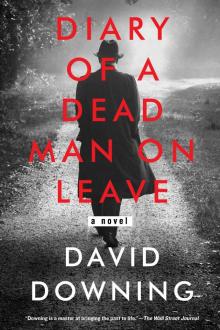 Diary of a Dead Man on Leave
Diary of a Dead Man on Leave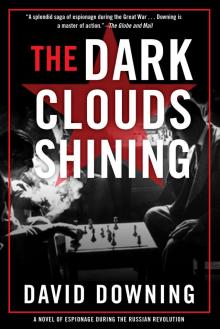 The Dark Clouds Shining
The Dark Clouds Shining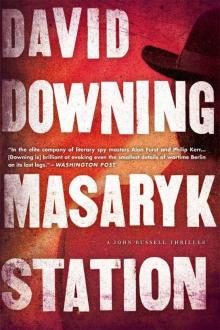 Masaryk Station (John Russell)
Masaryk Station (John Russell)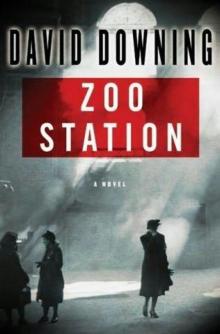 Zoo Stationee
Zoo Stationee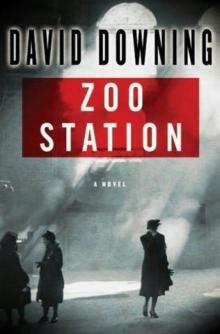 Zoo Station jr-1
Zoo Station jr-1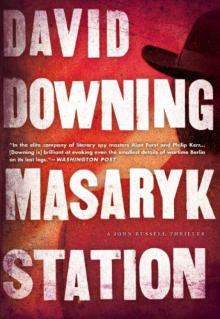 Masaryk Station
Masaryk Station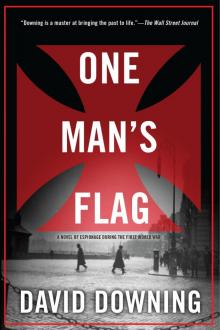 One Man's Flag
One Man's Flag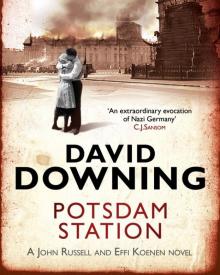 Potsdam Station jr-4
Potsdam Station jr-4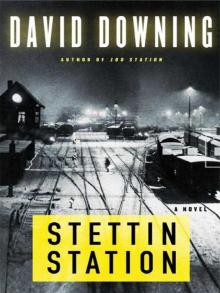 Stattin Station jr-3
Stattin Station jr-3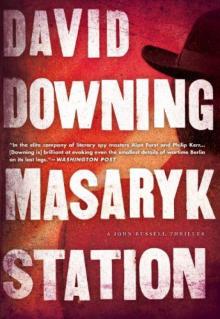 Masaryk Station jr-6
Masaryk Station jr-6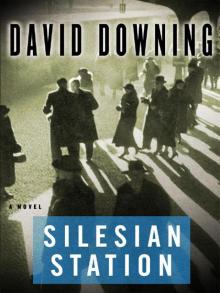 Silesian Station (2008) jr-2
Silesian Station (2008) jr-2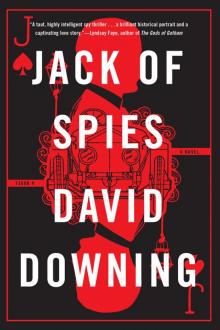 Jack of Spies
Jack of Spies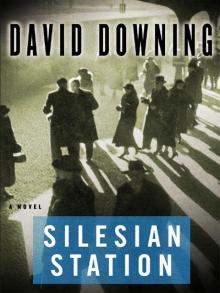 Silesian Station (2008)
Silesian Station (2008) The Moscow Option
The Moscow Option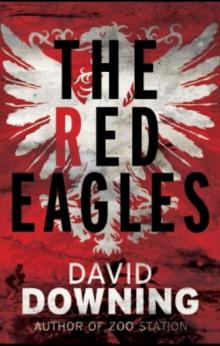 The Red Eagles
The Red Eagles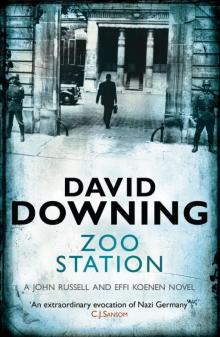 Zoo Station
Zoo Station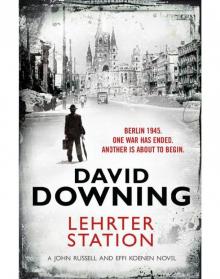 Lehrter Station
Lehrter Station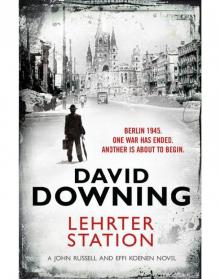 Lehrter Station jr-5
Lehrter Station jr-5